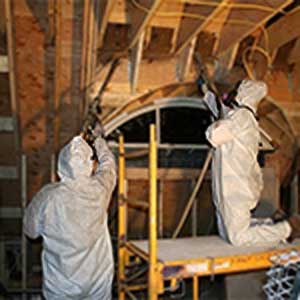We’re here for you around the clock, ensuring that help is always within reach, especially during critical fire and flooding emergencies.

Our team’s experience spans both residential and commercial jobs, showcasing our ability to manage projects of any scale effectively.

From water damage and fire & smoke damage to air duct cleaning and biohazard cleanup, we bring your property back to its pre-disaster state.
How to Extinguish a Grease Fire
Across the United States, home fires occur every seven seconds. According to NFPA, unattended cooking was the most significant cause of cooking fires and casualties.
While warming up the grease to sauté your favorite vegetables, the doorbell rings. You leave the kitchen to check who is at the front door. Unfortunately, the grease starts to overheat and produce smoke, and when you return, it catches on fire! The first thing you do to stop the fire can either work for you or against you. Knowing how to extinguish a grease fire and practicing proper grease fire safety is critical.
Across the United States, home fires occur every seven seconds. According to NFPA, unattended cooking was the most significant cause of cooking fires and casualties. So, to prevent this from happening in your home, we’ll share a few safety tips on how to put out a grease fire on a stove and what to do in a grease fire.
What is a grease fire? How do Grease Fires Start? Causes of Grease Fires?
If you cook with grease, like cooking oils or butter, and it gets too hot, you could end up with an oil fire on your stove or top. Grease becomes a fire hazard when it hits high temperatures. Oils made from vegetables begin to smoke at their smoke point of about 450°F, and fats from animals, including lard or goose fat, will start smoking at 375°F.
It’s super important to know that when you heat oils, they will boil and then smoke, and if they get hot enough, they’ll catch fire. Vegetable oils have a smoking point of around 450°F, and animal-based fats are set to smoke at about 375°F. Hot grease is a significant fire risk that can lead to a dangerous kitchen fire.
Remember These Tips on How to Stop a Grease Fire
To extinguish a grease fire, it is crucial to turn off the heat source, cover the flames with a metal lid or baking sheet, never use water, and use a fire extinguisher as a last resort. In case of escalating situations, calling emergency services is a must. The detailed steps to put out a grease fire are:
- Turn off the heat immediately as the burner, stove, or grill are heat sources, especially when you smell the oil or see smoke.
- Keep a metal lid near the counter for easy access if a fire starts. You can use this or any non-glass lid to cover the flames and extinguish a grease fire. You can also try shutting the lid to put out an oven fire.
- Keep baking soda and salt where they are easily accessible. If you fail to cover the fire, smother it with salt or baking soda to cut off the fire’s oxygen supply. Baking soda effectively puts out fires.
- If you have a Class K extinguisher, use it to extinguish a grease fire. This is the best method.
What you should not do in case of a grease fire…
- NEVER use or throw WATER on a grease fire to stop it. Don’t use water! This will spread the flames and make the fire out of control.
- Don’t move the pan or pot while the oil burns to prevent the spread.
- NEVER use flour, baking powder, or sugar, as they are combustible materials. They can do even more damage rather than help smother the fire.
- Contact your local fire department via 911 as soon as you’re safe and if you cannot handle the situation.
Grease Fire Prevention Tips
- Don’t leave the pot/pan unattended, especially if it has grease. This is key for kitchen safety.
- Be attentive, awake, and alert if you cook in the kitchen.
- Avoid placing combustible materials such as paper towels, potholders, or any wooden stuff in or near your countertops.
- Always clean up oil spills/grease and dirt in your burners and counters.
- Using a thermometer helps maintain the average rate of the oil temperature. Determine your cooking oils’ flash points and ignition temperature to prevent future fire-related damage.
- Thaw frozen food and eliminate moisture before you place it in hot oil to prevent grease fires. Slowly and gently put the food on a pan to avoid splattering oil.
- Turn off the heat immediately once the oil gets too hot and you see smoke.
- Avoid wearing oversized clothes and loose sleeves. If your clothes are caught on fire, do these three things to put out the fire: STOP, DROP, and ROLL. This can help prevent serious burn injuries.
- Place the fire extinguisher in your kitchen where you can easily access it. Ensure beforehand that you have prepared a proper class extinguisher for grease use. Call 911 in an emergency.
- Children should stay or play outside your kitchen, especially when you are cooking.
Call Fire and Smoke Damage Restoration Professionals
Have you recently experienced a grease fire break out in your kitchen and suffered damage in your home? Superior Flood and Fire has you covered after cooking fires. After you stop the grease fire, a fire damage restoration company will help restore your home!
Contact us, Water Damage San Jacinto, to begin a safe and fast restoration of your home today! We are always ready and available 24 hours a day, 7 days a week.
We also offer emergency water damage restoration and mold remediation services.



